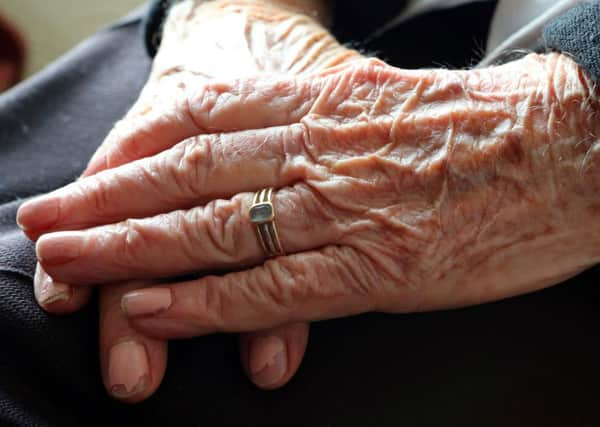Andrew Vine: We must be ready to pay for care of the vulnerable


Although the staff were kind, they were harassed because there were not enough of them, and the surroundings in which they rushed from one resident to another bore all the hallmarks of resources stretched to breaking point.
Faded paintwork, shabby furniture, carpets approaching threadbare and food costing less per head than that served to convicted prisoners made it feel less like a home than a dumping-ground where the frail elderly awaited the inevitable.
Advertisement
Hide AdAdvertisement
Hide AdYes, it ticked all the boxes of the inspection regime. But the staff, the management and the families of the residents all knew that this was the most basic end-of-life care, not grudging in its compassion or good intentions, but barely meeting needs.
Had there been the money to move my father somewhere better, he would not have stayed there.
But council care was the only option, and every time I left after visiting, the thought that this was a poor place for him to end up after a lifetime of hard work and paying taxes gnawed away at me.
That was more than 20 years ago, but the memory produced a distinct sense of déjà vu when an uncle went into privately-run care recently. On the face of things, this was a much better home – modern, purpose-built and comfortably furnished.
Advertisement
Hide AdAdvertisement
Hide AdYet looking a little closer during visits over several months revealed some things had not changed at all. There was the same harassed air about the staff, and constant turnover among them as they left these demanding, minimum-wage jobs for something better.
There was the same cheaply-produced food, and over everything hung the familiar sense of a home doing its duty whilst screwing costs down to the absolute minimum.
The similarities, though separated by a couple of decades, are just one illustration of how long the crisis in social care has been looming – and the shameful neglect of the vulnerable by successive governments which have looked the other way instead of doing something about it.
It isn’t just about the elderly. A friend whose middle-aged son has profound disabilities has just turned 70, not with celebrations, but with worry because he knows the point is approaching when he is no longer physically able to meet the needs of the man whom he calls “my lovely boy”.
Advertisement
Hide AdAdvertisement
Hide AdWhat will happen to him then? He asks himself that question night and day. Cuts forced on his local council have already led to reductions in the amount of respite care for his son. That means his father is deprived of the chance to rest and regain the strength to carry on.
Countless individual heartaches like this make up the inadequately funded mess that is this country’s social care.
They are the stories of old people stuck in hospital because there is nowhere else for them to go and nobody to look after them, or of families struggling to find places for their vulnerable relatives because private-sector providers hand back public-sector contracts that simply do not make commercial sense.
The Government’s proposal to allow a council tax levy to fund additional care is, at best, a short-term fix that will do little to address long-term problems, particularly in regard to the challenges presented by an ageing population.
Advertisement
Hide AdAdvertisement
Hide AdAnd what earthly point is there in trumpeting medical advances that allow people to live longer if those extended lives are characterised by worry and inadequate care?
If this crisis is to be addressed, this Government will have to show more resolve – and electoral courage – than any of the past 30 years.
If we want a decent level of care for the vulnerable of whatever age, we’re all going to have to pay for it.
Not through a temporary uplift in council tax – which reeks of a cynical attempt to load responsibility for the broken system onto local authorities instead of acknowledging it as a national problem – but by strategic action.
Advertisement
Hide AdAdvertisement
Hide AdNeither the Conservatives nor Labour have been willing to confront the care crisis while in office. There were no votes to be had in telling the country that income tax could not be cut because to do so would aggravate the funding gaps for care.
Breast-beating about commitment to the NHS was far more eye-catching than contemplating what happened to old people when they came out of hospital or those who did not need medical attention but simply looking after with care and compassion in the twilight of their lives.
There needs to be a mature debate and cross-party consensus about the state of social care. If that means paying more tax, then so be it.
More of us than ever before will need care in the years ahead, but that’s not the only reason to pay up uncomplainingly. It is also that we can’t claim to be a civilised society unless we provide proper care for the vulnerable.